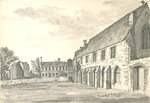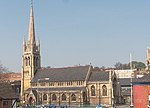The Lincoln Mechanics' Institute or Lincoln and Lincolnshire Mechanics' Institute was founded in Lincoln, England in 1833. It was one of the many Mechanics' institutes which sprang up in the early 19th century and was the first Mechanics' Institute to be founded in Lincolnshire.
The Institutes provided education for the working man through lending libraries, lecture theatres, class rooms and laboratories and often included courses and technical materials, and wider opportunities for learning and betterment. By the 1850s there were around 1,200 institutes in Great Britain, though some were known by different names, including Literary and Scientific Institutes, Reading Rooms, Useful Knowledge Societies, Athenaeums and Lyceums. However, after the creation of public libraries following the Public Libraries Act 1850 and the establishment of secondary and technical schools, Mechanics' Institutes either closed or changed into other institutions. Today only one Mechanics’ Institute remains in Lincolnshire, at Epworth.The Lincoln Mechanics’ Institute was housed in the undercroft of the Lincoln Greyfriars. At the time of its creation in 1833 it was merged with the Lincoln Literary Society. The undercroft contained schoolrooms, a library and a museum. The undercroft was leased to the Institute by the City Council and in 1862 the city council required the undercroft for the expansion of the Grammar School. The institute was then moved to larger premises in the City Assembly Rooms above the Buttermarket, adjacent to the St Peter at Arches Church. In 1892 the City Council decided to use these premises for a City Library and in 1896 the Mechanics' Institute was dissolved. At that time there were 600 members of the institute.The Lincoln Mechanics’ Institute was closely connected with several prominent men: George Boole, mathematician and creator of Boolean algebra; the Earl of Yarbourough; Charles Seely, the Liberal politician and industrialist; Edward Parker Charlesworth, known as an innovator in psychiatric treatment; and Thomas Cooper, the Chartist leader.











